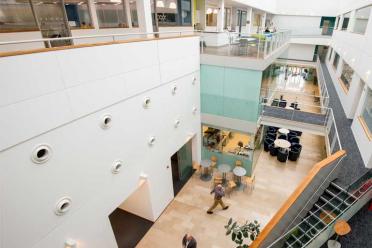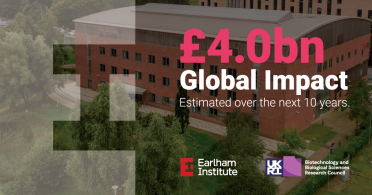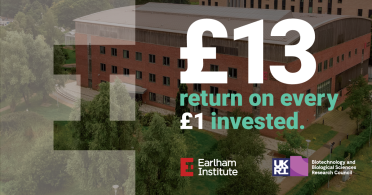With an anticipated return of nearly £13 globally for every £1 invested over the same time period, the report highlights the impact of the Norwich-based Institute’s diverse research, innovation and training activities.
Capturing the Economic Impact of The Earlham Institute was produced by Brookdale Consulting Ltd and assesses the Earlham Institute’s direct and indirect impacts across its portfolio of cutting-edge life science over the next 10, 15 and 25 years.
A major area of impact is in wheat research, where the Institute has played a foundational role in a number of global collaborations and contributed significantly to scientific understanding.
In this area of research alone, the Earlham Institute’s impact is estimated at £7.4m to the UK economy and £240m to the rest of the world over the next 10 years. The global impact is projected to rise to an estimated £1.5bn over 25 years.
A growing area of impact is in aquaculture and the development of genomic resources for breeders - particularly in east Africa. As farmed fish continues to overtake traditional line and net fishing practices, the need for breeders to improve yield, nutritional value, and resilience grows more important.
Based on the Institute continuing to help improve productivity in the future, the economic impact of this work is valued at more than £140m over the next decade.
The Earlham Institute’s research also covers human health, with a major interest in tackling the rise of antimicrobial resistance around the world. As this science is applied, it could help reduce infections and deaths linked to AMR with an estimated global saving of close to £80m over the next 10 years.
Professor Neil Hall, Director of the Earlham Institute, said: “Applying our science to benefit society is a key part of the Earlham Institute’s mission. Our core funding comes from the public purse, which means we have a responsibility to ensure every pound is spent wisely.
“This report shows that, across a diverse portfolio of research, innovation and training, we’re giving a great return on investment. If we can unleash the huge potential of data-intensive bioscience over the coming years, we can make a significant impact on the prosperity and wellbeing of people and the planet.”
Elsewhere, the report measures the impact from the Earlham Institute’s response to the COVID-19 pandemic, the potential of new sequencing technology being developed at EI, and the benefits of its Advanced Training programme.
Dr Liliya Serazetdinova, Head of Business Development and Impact, said: “The Earlham Institute’s work bridges the gap between the life sciences and computational approaches. This puts us in a fantastic position to lead the transition toward data-intensive bioscience, working with our partners to power breakthroughs in a range of important areas.
“From developing new technology and training the next generation of scientists to tackling major scientific challenges, this report gives a positive forecast of the global impact our work has the potential to achieve.”


